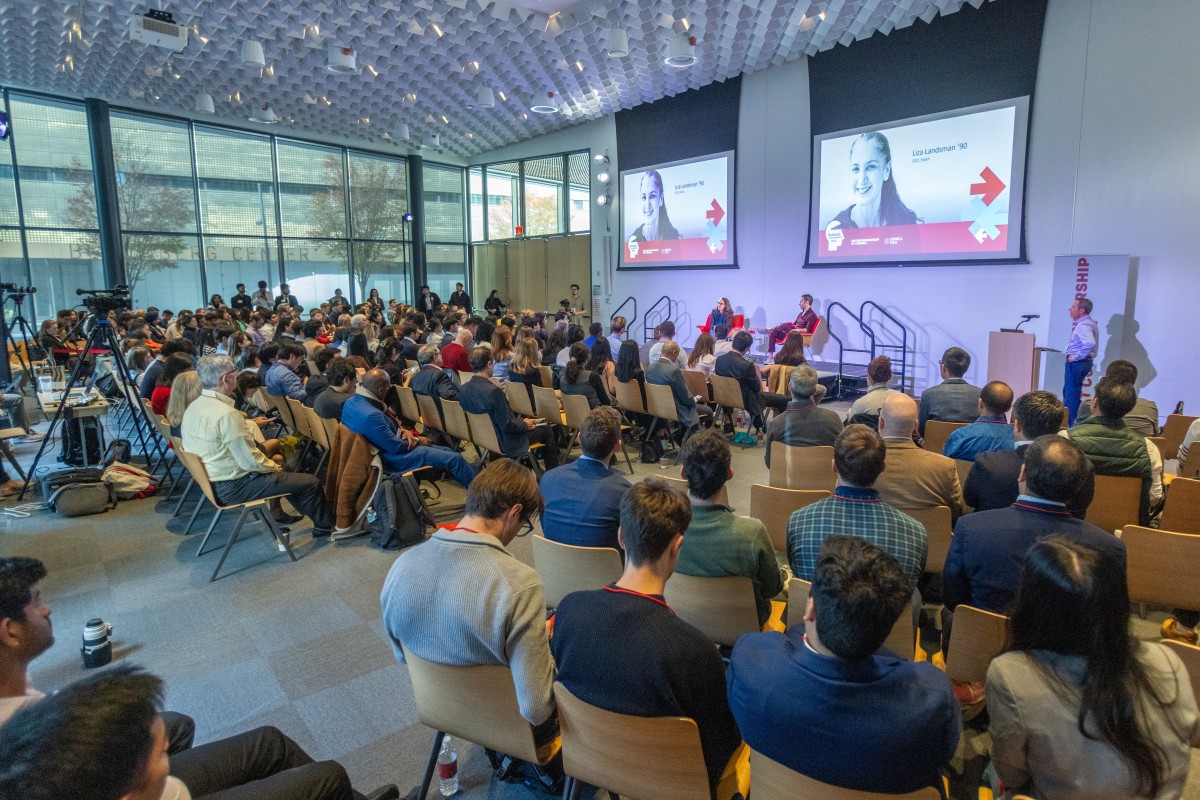
Ponsi Trivisvavet knew she had found her true north when the seeds she delivered to an Indonesian farmer helped him to increase his crop yields enough that he was able to buy a cow – to provide meat for his family — for the first time in his life. The farmer can now afford to pay for his children’s education and envision a future for next generations.
Trivisvavet, the CEO of Inari and a Cornell alumna, was one of six featured speakers at the Nov. 15 Eclectic Convergence conference, a yearly event hosted by Entrepreneurship at Cornell that brings more than 400 people to Cornell Tech in Roosevelt Island, New York City.
Her company uses multiplex gene editing and AI-powered predictive design to develop seeds that grow plants that use less land, less fertilizer and less water, but provide higher yields.
For now, Inari is focusing on soybeans, corn and wheat seeds, which account for 70 percent of the market, but the company’s technology is transferable to other seeds as well.
“It’s exciting when you get to work on the most difficult technology, it’s exciting when you work on not just a blue ocean but a new ocean,” she said. “We are doing something where people might call us crazy or unreasonable, where people will tell us it’s impossible, but we choose to work on that route anyway. Seven years ago, we were told that multiplex gene editing can’t be done in plants, and now look at us.”
The conference also included a pitch contest for new companies. Dr. Paraskevi Giannakakou, a professor of pharmacology in medicine at Weill Cornell Medicine, presented the novel prostate cancer treatment her company is developing. Prostate cancer, a leading cause of cancer death in men in the United States, is driven by androgen receptor (AR) signaling. As a result, AR inhibitors represent 90% of prostate cancer therapeutics. However, the undruggable AR splice variant 7 (AR-V7) causes resistance to current therapies.

Dr. Paraskevi Giannakakou presenting to the audience
Compared with existing AR inhibitors in the market, Dr. Giannakakou’s small molecule glue degrader eliminates both AR full length and AR-V7, thus it could avoid and reverse treatment resistance and treat PC patients at all stages of the disease. Dr. Giannakakou’s startup ARMA Bio has already raised $3.5 million in non-diluted funding to perform critical pre-clinical experiments. The company is seeking additional funding to bring its target to IND clearance.
Dr. Bobak Mosadegh, an associate professor of biomedical engineering in radiology at Weill Cornell Medicine, also participated in the pitch competition. Dr. Mosadegh co-founded SmartHER with Dr. Tamatha Fenster, an assistant professor of clinical obstetrics and gynecology, to enhance women's health.
SmartHER was founded on a patented platform technology that takes images from standard diagnostic imaging and processes and visualizes them in 3D renderings on any standard hardware device such as a tablet, cell phone or extended reality (XR) headset. SmartHER is currently focused on uterine fibroids, but the technology can be applied to surgeries for other indications in the gynecologic space. The AI algorithms used to automatically segment fibroid images and generate holistic 3D renderings are trained with data from Weill Cornell Medicine. A pilot study demonstrated the technology eliminates repeat procedures and has high surgeon satisfaction rate. Dr. Mosadegh and his team are seeking non-diluted funding and are having conversations with several medical device companies for potential licensing deals.
“There was a recent report that talks about a $1 trillion economic impact due to the gap in the support for women’s health. At SmartHER, we want to use AI and XR to close this gap,” Dr. Mosadegh said during his presentation.

Dr. Bobak Mosadegh answering judges' questions
Elm AI, which uses AI to help companies review documents from suppliers, streamlining the due diligence process, won the competition. The company was founded by Advait Raykar, Aparajita Thakker and Ken He, all Cornell Tech graduates.
Conference participants joined in networking activities, met one-on-one with speakers during “speaker hours” and learned about student businesses.
Attendees at the event included alumni, staff, faculty and students from the Ithaca, Cornell Tech and Weill Cornell campuses, as well as entrepreneurs and faculty and students from many other institutions, including 20 students and five faculty members from Tsinghua University in Beijing, China.
“I love this conference because there are fascinating people who, even if they’re talking about something completely unrelated to what I’m doing, they’re so curious and they have this confidence to take a risk and figure it out,” said Cornell alumnus Jordan Berman, founder and CEO of OFC, a creative agency and video production company. “This is like getting a sip of motivation. And being around students who are so excited about getting into entrepreneurship, it brings me back to when I was a student at Cornell.”
A version of this story, authored by Kathy Hovis, writer and podcast host for Entrepreneurship at Cornell, first appeared on the college’s newsroom.
Many Weill Cornell Medicine physicians and scientists maintain relationships and collaborate with external organizations to foster scientific innovation and provide expert guidance. The institution makes these disclosures public to ensure transparency. For this information, see profile for Dr. Tamatha Fenster, Dr. Paraskevi Giannakakou and Dr. Bobak Mosadegh.

